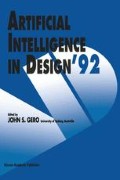Abstract
In this paper, LEAR, a concept learning system for decision support in routine design tasks, is presented. LEAR learns incrementally from the instances which are generated during normal design sessions with a host CAD system. To achieve this an existing learning method was adapted to task specific constraints and complemented with several novel approaches to knowledge organization. This includes a flexible distributed concept representation which exploits background knowledge to reduce the complexity of the learning process as well as an efficient method for constructive induction which uses fuzzy sets to determine the most suitable high level attributes.
Access this chapter
Tax calculation will be finalised at checkout
Purchases are for personal use only
Preview
Unable to display preview. Download preview PDF.
References
Balachandrian, M. and Gero, J.S.: 1990, Role of Prototypes in Integrated Expert Systems and CAD Systems, in: Gero, J.S. (ed.), Applications of Artificial Intelligence in Engineering V, Vol. 1 Design, Computational Mechanics Publications, Boston, pp. 195–211
Berkcan, E., dÁbreu, M. and Laughton, W.: 1988, Analog Compilation Based on Successive Decomposition, Proc. 25th ACM/IEEE Design Automation Conf. pp. 369–375
Buchanan, B.G.: 1989, Can Machine Learning Offer Anything to Expert Systems?, Machine Learning, 4, pp. 251–254
Chandrasekaran, B.: 1989, Task-Structures, Knowledge Acquisition and Learning, Machine Learning, 4, pp. 339–345
Chandrasekaran, B.: 1990, Design Problem Solving: A Task Analysis, AI Magazine, Vol. 11, No. 4, pp. 59–71
Cheng, J. et.al.: 1988, Improved Decision Trees: A Generalized Version of ID3, Proc. 5th Int. Workshop on Machine Learning
Felix;, R.: 1990, Goal-oriented Control of VLSI Design Processes Based on Fuzzy Sets, Proc. 20th Int. Symposium on Multiple-Valued Logic, Charlotte, N.C., pp. 386–393
Forsyth, Richard (ed.): 1989, Expert Systems — Principles and Case Studies, Chapman and Hall
Gero, J.S. (ed.): 1988a, Artificial Intelligence in Engineering: Design, ELSEVIER Publishers, New York, Tokyo
Gero, J.S. (ed.): 1988b, Artificial Intelligence in Engineering: Diagnosis and Learning, ELSEVIER Publishers, New York, Tokyo
Gero, J.S. (ed.): 1990, Applications of Artificial Intelligence in Engineering V, Vol. 1 Design, Computational Mechanics Publications, Southampton, Boston
Herrmann, J. and Reusch, B.: 1987, Combining Expert Systems and Machine Learning in CAD Systems for Micro Electronics, Proc. Int. Workshop on AI Applications to CAD Systems for Electronics, Oktober 1987
Herrmann, J.: 1991, Learning Analytical Knowledge about VLSI-Design from Observation, Proc. of the Eighth Int. Workshop on Machine Learning
Horner, R. and Brown, D.C.: 1990, Knowledge Compilation Using Constraint Inheritance, in: Gero, J.S. (ed.): Applications of Artificial Intelligence in Engineering V, Vol. 1 Design, Computational Mechanics Publications, Boston, pp. 161–174
Lebowitz, M.: 1985, Categorizing Numeric Information for Generalization, Cognitive Science, No. 9, pp. 285–308
Maher, M.L.: 1990, Process Models for Design Synthesis, AI Magazine, Vol. 11, No. 4, pp. 49–58
Michalski, R.S.: 1987, Learning Strategies and Automated Knowledge Acquisition, in: Leonard Bolc (ed.), Computational Models of Learning, Springer Verlag, Berlin
Milzner, K. and Klinke, R.: 1990, Synthesis of Analog Circuits using a Black Board Approach, Proc. Third International Conf. on Industrial and Engineering Applications of AI and Expert Systems, Charleston S.C., Vol. 1, pp. 114–122
Milzner, K.: 1991, An Analog Circuit Design Environment Based on Cooperating Black Board Systems, Journal of Applied Intelligence 1, Kluwer Academic Publishers, Boston, pp. 179–194
Milzner, K. and Brockherde, W.: 1991, SILAS: A Knowledge Based Simulation Assistant, IEEE Journal of Solid-State Circuits, Vol. 26, No. 3, pp. 310–318
Pagallo, G. and Haussler, D.: 1990, Boolean Feature Discovery in Empirical Learning, Machine Learning, No. 5, pp. 71–99
Powell, DJ., Skolnick, M.M. and Tong, S.S.: 1990, EnGENous: A Unified Approach to Design Automation, in: Gero, J.S. (ed.): Applications of Artificial Intelligence in Engineering V, Vol. 1 Design, Computational Mechanics Publications, Boston, pp. 137–157
Quinlan, J.R.: 1986, Induction of Decision Trees, Machine Learning, No.l, pp. 81–106
Reich, Y.: 1991a, Designing integrated learning systems for engineering design, Proc. of the Eighth Int. Workshop on Machine Learning, pp. 635–639
Reich, Y.: 1991b, Macro and Micro Perspectives of Multistrategy Learning, Proc. of the First Conf. on Multi-Strategy Learning, pp. 97–112
Rich, E.: Artificial Intelligence; McGraw-Hill, 1983
Schlimmer, J.C. and Granger, R.H.: 1986, Incremental Learning from Noisy Data, Machine Learning I, pp. 317–354
Schlimmer, J.C.: 1987a, Learning and Representation Change, Proc. 6th Int. Conf. on Artificial Intelligence, pp. 511–515
Schlimmer, J.C.: 1987b, Incremental Adjustment of Representations for Learning, Proc. 4th Int. Workshop on Machine Learning, pp. 79–89
Schlimmer, J.C: 1987c, Concept Acquisition through Representational Adjustment, PhD. thesis, University of California, Irvine
Sheu, B.J., Lee, J.C and Fung, A.H.: 1990, Flexible architecture approach to knowledge-based analogue IC design, IEE Proceedings, Vol.137, Pt.G, No.4, August 1990, pp.266–274
Simoudis, E.: 1990, Learning Redesign Knowledge, IEEE Trans, on Computer-Aided Design, Vol. 9, No. 10, pp. 1047–1062
Steier, D.: 1990, Creating a Scientific Community at the Interface Between Engineering Design and AI, AI Magazine, Vol. 11, No. 4, pp. 18–22
Utgoff, P.E.: 1988, ID5: An Incremental ID3, Proc.5th Int. Workshop on Machine Learning
Zadeh, L.A.: 1965, Fuzzy Sets and Systems, Proc. Symposium on System Theory, Polytechnic Press of the Institute of Brooklyn, New York, pp. 29–37
Author information
Authors and Affiliations
Editor information
Editors and Affiliations
Rights and permissions
Copyright information
© 1992 Springer Science+Business Media Dordrecht
About this chapter
Cite this chapter
Milzner, K., Harbecke, A. (1992). Incremental Learning for Improved Decision Support in Knowledge Based Design Systems. In: Gero, J.S., Sudweeks, F. (eds) Artificial Intelligence in Design ’92. Springer, Dordrecht. https://doi.org/10.1007/978-94-011-2787-5_36
Download citation
DOI: https://doi.org/10.1007/978-94-011-2787-5_36
Publisher Name: Springer, Dordrecht
Print ISBN: 978-94-010-5238-2
Online ISBN: 978-94-011-2787-5
eBook Packages: Springer Book Archive

